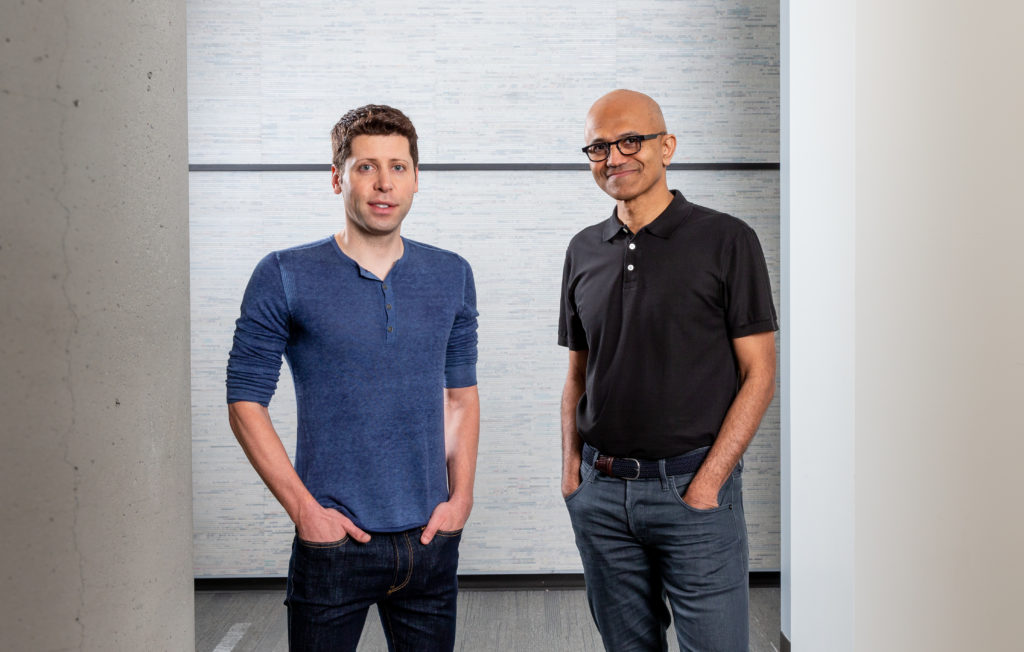
Microsoft and OpenAI’s close relationship has taken another leap forward with the former gaining exclusive GPT-3 access.
GPT-3 has been the talk of the AI town in recent months. OpenAI’s innovation can help to create convincing articles and the company once deemed it too dangerous to release in a world where misinformation and fake news is already problematic.
OpenAI never made GPT-3 publicly available but instead provided access to a limited number of trusted researchers.
Microsoft announced today that it now has the exclusive rights to leverage GPT-3’s “technical innovations to develop and deliver advanced AI solutions for our customers, as well as create new solutions that harness the amazing power of advanced natural language generation.”
In other words, Microsoft will be able to deploy GPT-3 capabilities in products such as Office, Windows, and Teams.
Kevin Scott, Chief Technology Officer at Microsoft, wrote in a blog post:
“GPT-3 is the largest and most advanced language model in the world, clocking in at 175 billion parameters, and is trained on Azure’s AI supercomputer.
Today, I’m very excited to announce that Microsoft is teaming up with OpenAI to exclusively license GPT-3, allowing us to leverage its technical innovations to develop and deliver advanced AI solutions for our customers, as well as create new solutions that harness the amazing power of advanced natural language generation.”
There has been some debate over the impact GPT-3 will have on society. Some believe it’s dangerous, while others don’t think it poses a threat (at least in its current form.)
A Guardian article earlier this month with the headline ‘A robot wrote this entire article. Are you scared yet, human?’ really kicked off the debate.
The article used GPT-3 to generate its content but was accused of being misleading as it required substantial human intervention.
For the Guardian’s article, a human first wrote 50 words. GPT-3 then created eight drafts from the contributed text. A human then went through each of the eight drafts and picked the best parts. Finally, a human went on to edit the text to make it coherent before publishing it.
AI expert Jarno Duursma called GPT-3 “essentially a super-advanced auto-complete system.”
A blossoming relationship
Last year, Microsoft invested $1 billion in OpenAI to help speed up the development of Artificial General Intelligence (AGI) – which overcomes today’s AI limitations.
Current AIs are designed for specific tasks and require some human input. AGIs will be able to think like a human and handle multiple tasks, similar to how JARVIS and HAL are portrayed in films.
Microsoft’s bumper investment in OpenAI secured its place as the exclusive provider of cloud computing services for the AI giant. Together, the pair have committed to building new Azure AI supercomputing technologies.
Satya Nadella, CEO of Microsoft, said last year of the company’s OpenAI investment:
“AI is one of the most transformative technologies of our time and has the potential to help solve many of our world’s most pressing challenges.
By bringing together OpenAI’s breakthrough technology with new Azure AI supercomputing technologies, our ambition is to democratise AI — while always keeping AI safety front and centre — so everyone can benefit.”
The exclusive rights to use GPT-3 is the first major win for Microsoft from its OpenAI investment, but it’s unlikely to be the last.
Back in May, Microsoft signed another deal with OpenAI to build an Azure-hosted supercomputer for testing large-scale models.
Microsoft and OpenAI’s supercomputer will deliver eye-watering amounts of power from its 285,000 CPU cores and 10,000 GPUs. Such power will be required for achieving the holy grail of AGI.
“We’ve learned more and more about what we need and the different limits of all the components that make up a supercomputer,” said Sam Altman, CEO of OpenAI earlier this year. “Microsoft was able to build it.”
The blossoming relationship between Microsoft and OpenAI looks only set to get stronger in the coming years.






